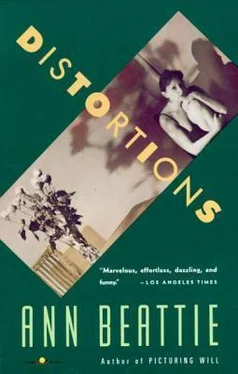Ann Beattie - Distortions
Здесь есть возможность читать онлайн «Ann Beattie - Distortions» весь текст электронной книги совершенно бесплатно (целиком полную версию без сокращений). В некоторых случаях можно слушать аудио, скачать через торрент в формате fb2 и присутствует краткое содержание. Год выпуска: 1991, Издательство: Vintage, Жанр: Современная проза, на английском языке. Описание произведения, (предисловие) а так же отзывы посетителей доступны на портале библиотеки ЛибКат.
- Название:Distortions
- Автор:
- Издательство:Vintage
- Жанр:
- Год:1991
- ISBN:нет данных
- Рейтинг книги:5 / 5. Голосов: 1
-
Избранное:Добавить в избранное
- Отзывы:
-
Ваша оценка:
- 100
- 1
- 2
- 3
- 4
- 5
Distortions: краткое содержание, описание и аннотация
Предлагаем к чтению аннотацию, описание, краткое содержание или предисловие (зависит от того, что написал сам автор книги «Distortions»). Если вы не нашли необходимую информацию о книге — напишите в комментариях, мы постараемся отыскать её.
Distortions — читать онлайн бесплатно полную книгу (весь текст) целиком
Ниже представлен текст книги, разбитый по страницам. Система сохранения места последней прочитанной страницы, позволяет с удобством читать онлайн бесплатно книгу «Distortions», без необходимости каждый раз заново искать на чём Вы остановились. Поставьте закладку, и сможете в любой момент перейти на страницу, на которой закончили чтение.
Интервал:
Закладка:
She said that she wanted a big house so the baby could run and play. They have one daughter, Elizabeth, who is five. He liked the house, but wasn’t it too close to the road? She watched the baby, unlike other mothers, so what did it matter? Besides, it was the size of the house that mattered. The house had so many possibilities. When they first moved in she spent so much time redoing the house that she couldn’t have had time for a lover. The messages were few and far between at that time. But in the fall Elizabeth went to kindergarten and most of the rooms were finished, and then he began to get the messages daily, and sometimes there were two a day. From the first he never thought they were a joke, and maybe that was where he bungled — if he had only scoffed at them she might have seen that he genuinely didn’t believe it. There had been an envelope addressed to him in his wife’s handwriting and she had brought it to him while he was having breakfast, and he had smiled, expecting some kind of joke, and of course he had been doubly let down. If only he hadn’t recognized the handwriting.
The notes are different now. The first notes, the fall notes, were brief, specific, and often personally insulting. The winter notes were longer, less specific, more … what might be called mystical. She felt that she was becoming a part of something large, large and important. In the spring there were rhymes, or little drawings, sometimes a combination: a sketch of a little animal-groundhog? — with a verse: “We went to the zoo/The sky was so blue/The sky was so blue/Then what did we do?/Then what did we do?” Now the notes are questioning — no easy clues as in the spring notes: “There is something vast and warm as summer, and at times I am as warm as summer, but other times I am cold and pull up the blanket in my sleep. How, exactly, does the mind let you know you are cold? What signal makes me move when I intend not to move?”
One night he says her name out loud, whispers “Janet” in his sleep. Either asleep or awake she puts her arm out to stroke his side. He knows why he woke up, though — not her touch, but what he was thinking. What signaled him? What will happen now?
As a joke, almost, he writes her a message when he gets to work and has his secretary mail it. All day he thinks, Do I need a psychiatrist? Answered by, Who have they helped? Should I speak to her mother again? Answered by, Didn’t she already tell you to leave her alone? He goes home, has dinner, plays with Elizabeth, does a little work, and goes to bed. For hours he turns in the bed, wondering what will happen. More than that, though, he is lonesome and wishes Janet would wake up. He thinks of pretending to be asleep and rolling over on her, or of calling her name — no whispering, right out loud. A cheap trick. He kicks the covers off and looks at whatever objects he can see in the room in spite of the dark and in spite of his limited perspective. And then she stirs too — for covers? No — she’s quietly getting out of bed.
“A message?” he whispers.
“Yes.”
This is the first time they have ever discussed the messages when she’s in the process of writing them.
“Coffee?” he asks.
“All right.”
She sits sleepily across from him at the kitchen table, and for a while as she drinks the coffee he thinks she’s forgotten about the notes she intended to write. Almost mechanically she scrawls a few words on a pad and puts a piece of paper in an envelope, then drops the envelope on the counter and walks beside him down the hall to bed. It’s a humid night and the sheets feel sticky. He has trouble going to sleep. Finally he stops trying and throws his legs over the side of the bed.
“Getting up?” she says.
“Yes.”
“It’s so humid it’s hard to sleep.”
He gets up and walks across the floor.
“Mail the letter while you’re up,” she says.
“No,” he says. “I refuse.”
The room is silent, and then she laughs. He goes back to the bed. She’s half on his side of the bed and makes no attempt to move. He lies down anyway. She begins to whisper — about something vast that surrounds them. Doesn’t he feel its presence? What can they do? He rests an arm across her stomach. He can’t answer the question when she whispers to him any better than he can when she writes it. He takes his arm away and pounds the bed.
“Yes,” she says. “There.”
It is a humid night, so it will be difficult to sleep. In the morning she will get his note, and that will be inadequate too, because it doesn’t contain any answers.
II
The lover thinks that he is compared unfavorably to other lovers. In fact he is no longer her lover, but he remembers when he was, and that depresses him because he never intended to become her lover and he never intended to stop being her lover. She left because he got nasty. One time they argued — well, a lot of times they argued — but one particular time they argued walking into the house and he bent to make a snowball, then another, and another. He threw them all at her, and instead of running into the house she ran around the house and, of course, finally fell. He didn’t realize that she had really been frightened until he put out his hand to help her up and she tried to scramble backward with that strange expression on her face. Then, of course, the martyrdom: he could save his energy by just kicking snow over her instead of pulling her up. Go on, go on … He wasn’t opposed to kicking a little snow? She was afraid of him sometimes, but she still fought with him.
Pulling up in front of the house where she lives now, he tries to remember pleasant things. How they had watched the snow falling in the morning. The morning of the day he threw snowballs at her. The morning of the day she turned her ankle. He didn’t turn the ignition off. One of the girls she lived with looked at his car from where she stood on the front lawn. She must have been surprised when he took off again. She must have wanted to get a good look at him because no doubt she had heard stories about the girl’s lover.
“Heard any stories about me?” he asks pleasantly when he returns to the house.
The girl has. She looks at him without speaking. She must be a little afraid of him, though, because she gives a half nod. The girl has brown braids and wears a backless summer dress. He toys with the idea of asking if she wants a lover.
“It’s your lover,” he calls through the screen door.
She comes to the door smiling. One of the things she likes about him is his sense of humor. What does she think is funny about his having been her lover?
She shows him around. She says she is happy in the house. She points out a table she likes. This house is furnished. They had very little furniture in the other house, although that too was “furnished.” He tries to remember the inside of the other house and ends up remembering being her lover. He says nothing about the table she shows him. She asks if he has eaten dinner. Does he want to go out, then, or just listen to some music? Go out. Where will they go? It was always her fault — she was always so quick to be cynical. He thinks about telling her they can go out and throw snowballs so he can watch her face change — so he can notice something familiar about her face. This doesn’t even look like her face. He remembers that she shares the house with three other girls. What do they look like? Maybe one of them was his lover.
When he drove away from this house the first time he came, he went to a liquor store and bought some bourbon and drank it. She must have guessed that. She once thought he had been drinking when she smelled Lysol in the house. Lysol! If she’s as uncomfortable as he thinks she is, maybe she’ll drink some. She drank, too, but she always had something to say about his drinking.
Читать дальшеИнтервал:
Закладка:
Похожие книги на «Distortions»
Представляем Вашему вниманию похожие книги на «Distortions» списком для выбора. Мы отобрали схожую по названию и смыслу литературу в надежде предоставить читателям больше вариантов отыскать новые, интересные, ещё непрочитанные произведения.
Обсуждение, отзывы о книге «Distortions» и просто собственные мнения читателей. Оставьте ваши комментарии, напишите, что Вы думаете о произведении, его смысле или главных героях. Укажите что конкретно понравилось, а что нет, и почему Вы так считаете.












